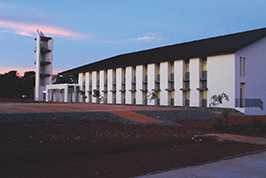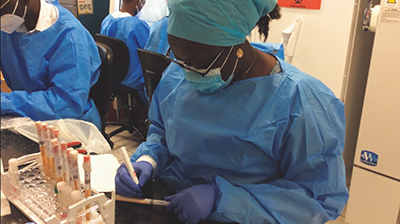Stories from the Field 1
Using Experience Gained in Japan for Measures against Infectious Diseases in the Future
—An ex-JICA training participant fighting against COVID-19 at the Noguchi Memorial Institute for Medical Research in Ghana—

NMIMR’s Advanced Research Center for Infectious Diseases. Construction was carried out with Japan’s support and completed in March 2019. (Photo: JICA)

Dr. Adusei-Poku preparing a PCR test (Photo: JICA)
Noguchi Memorial Institute for Medical Research (NMIMR) was established in 1979 with support from Japan to commemorate the achievements of Dr. NOGUCHI Hideyo, a bacteriologist who devoted his life to tirelessly researching yellow fever. The Institute is now greatly contributing to preventing the spread of COVID-19 in Ghana. NMIMR had carried out over 350,000 COVID-19 PCR tests as of the end of December 2020, and it was responsible for approximately 80% of all tests undertaken in Ghana at the peak of the pandemic. For approximately 40 years since NMIMR’s establishment, Japan has not only contributed to improving research equipment at the Institute, but also to developing its human resources through numerous targeted research activities and projects as countermeasures against infections and epidemics.
Dr. Mildred Adusei-Poku is one of the Ghanaian researchers working on the frontline at NMIMR right now. A virologist, Dr. Adusei-Poku started working at NMIMR in 2009, participating in the Science and Technology Research Partnership for Sustainable Development (SATREPS) program* under the “Studies of Anti-viral and Anti-parasitic Compounds from Selected Ghanaian Medicinal Plants” project conducted from 2010 to 2015. She talked about joining NMIMR, as well as her experience during her visit to Japan under the above-mentioned project, as follows.
“In Ghana, people are required to complete a mandatory one year of National Service after their undergraduate studies. I was assigned to the Virology Department at NMIMR as I had studied Biological Sciences. It was a great honor for me since, even at that time, NMIMR was one of the largest research institutes in Africa conducting advanced research in the areas of infectious diseases and nutrition. Later, I was part of a team that undertook research exploring medicinal plants in Ghana that could be effective in the treatment of HIV/AIDS. During that period, I attended a three-week training program at the Tokyo Medical and Dental University in Japan as part of the SATREPS project. I learned research and problem-solving methods that were new to me, and it was a privilege for me to share this knowledge with my colleagues at NMIMR on my return.”
Dr. Adusei-Poku then began studying at Kumamoto University in Japan on a Japanese Government Scholarship (Monbukagakusho: MEXT) in 2015, earning a doctorate degree for her research on HIV/AIDS. She stated that her senior colleagues at NMIMR who had experience in Japan encouraged her to pursue a doctorate degree in Japan. Following her seniors’ footsteps, she is now supervising activities related to COVID-19 at NMIMR while also lecturing at the Department of Medical Microbiology, the University of Ghana Medical School.
Dr. Adusei-Poku talked about the role of NMIMR in Ghana. “NMIMR was one of only two institutes testing for COVID-19 in Ghana when the country confirmed its first cases in March 2020. Therefore, NMIMR worked to enhance the testing capacity of other medical institutions to increase the number of testing facilities in the country. I was one of the people who had the privilege to instruct professionals at these other institutes on how to effectively test for the disease and handle the test results.”
Dr. Adusei-Poku talked about her own future. “I will seek to enhance my knowledge and experience, as well as explore collaborative working relationships that will improve our collective understanding of infectious diseases.” It is hoped that NMIMR will continue to cultivate more people like Dr. Adusei-Poku who can lead the fight against infectious diseases in Africa.
*See the Glossary.
Next Page >>
Main Text | Reference Statistics | Reference Materials | Stories from the Field | Master Techniques from Japan to the World | ODA Topics
